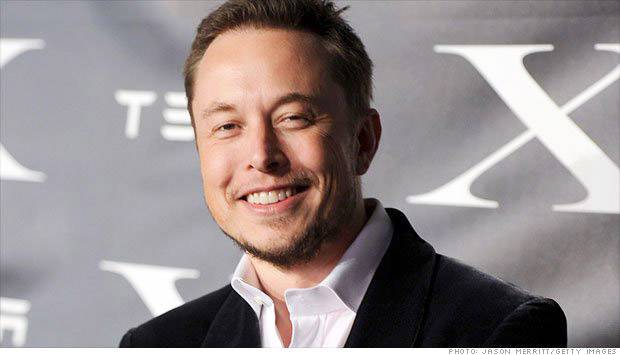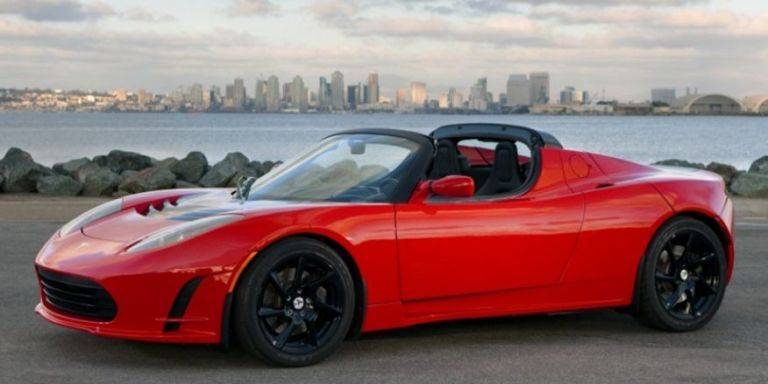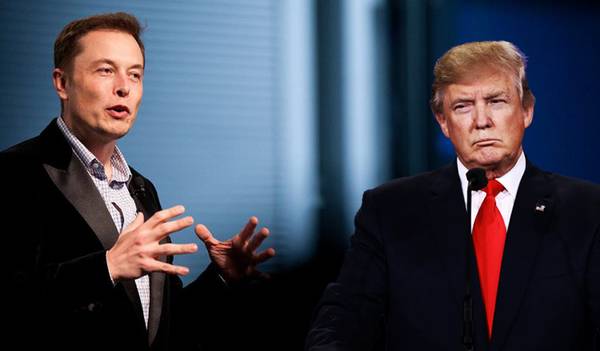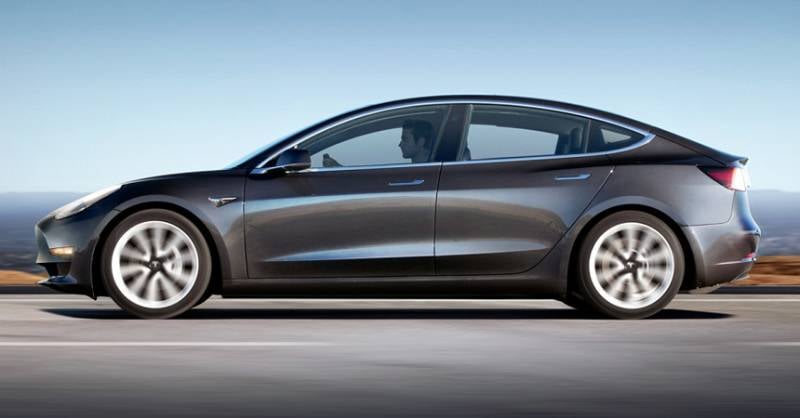Trump, oil and electric cars. What threatens Tesla?
History Tesla take-off is inextricably linked with the growing interest in electric vehicles. Given the high prices for oil and gasoline and the growing propaganda of environmental values, electric cars became fashionable at the beginning of the XXI century, which was used by the American businessman of South African origin Ilon Musk, the creator of PayPal and Space Exploration Technologies Corporation. Although the direct founders of Tesla, named after Nikola Tesla, were Mark Tarpenning and Martin Eberhard, it is with Ilon Mask that the true success of the company is connected. Indeed, at the beginning of the company's existence, it became its largest investor, having invested millions of dollars in Tesla 70.

From the very beginning of the company's existence, the main project of Tesla was the production of a mass electric vehicle that would be available to a wide range of interested buyers and would gradually crowd cars. But for the realization of this goal, impressive means were required. Therefore, it was decided to first release a relatively small number of expensive sports electric cars that would be bought by wealthy people for reasons of prestige and the desire to have an unusual novelty. With the proceeds from the sale of sports cars, it was planned to launch low-cost electric cars into mass production.
In 2006, the Tesla Roadster, the company's first electric car, was presented. It was a sports electric car, launched into mass production in the 2008 year. In total, according to Ilona Mask, Tesla Roadster 1000 electric vehicles were released. The cost of a sports electric car of this model was 175 thousand dollars - not the low price, even by American standards.

Then, a cheaper, ordinary Tesla Model S electric car was put into mass production, which cost customers 40-150 thousands of dollars, depending on the specific characteristics. In 2015-2016 Tesla Model S was sold on 50 thousands of cars a year, becoming the best-selling and well-known brand of electric vehicles, not only in the United States, but also in the world as a whole. Tesla Model S appeared even in Russia, though in very limited quantities - according to some information, the number of electric cars of this brand in our country ranges from 80 to 100 copies. Tesla Model S sales were particularly effective in Norway, where the government adopted the official program of state support for electric vehicles. As a result, Tesla Model S in Norway was able to overtake even the previously very popular Volkswagen Golf in terms of sales. The demand for electric cars and the American market has increased.
The success of the Tesla Model S electric car market inspired the company and already in 2012, the Tesla Model X crossover was introduced. However, the company started to produce and sell the first problems. The start date of mass production of the crossover was gradually postponed - until the end of 2015 year. In 2016, 2400 crossovers were sold. However, 31 March 2016 was presented by Tesla Model 3. Electric five-seater sedan was the first model of the company, focused on the mass consumer. Tesla hoped that a widely advertised model would be bought by a large number of people around the world. This was facilitated by the cheap price of an electric car in the basic configuration - just 35 thousand dollars.
In principle, the company's management was not mistaken - even before the start of production of pre-orders for the Tesla Model 3, about half a million people registered. 180 thousands of people filed applications on the first day after the model’s presentation, when a reservation was opened. For the first three days, the number of orders amounted to 276 thousands. Potential buyers made a refundable deposit in the amount of 1000 dollars per vehicle to the company. However, this time there were problems of another kind - now Tesla could not organize properly the production of the ordered models. Although the company first claimed that the 2017 of thousands of Tesla Model 20s would be released on December 3 of the year, by October 2017 only 360 of ready-made electric vehicles appeared.
What happened and why exactly did Tesla find itself in such a difficult situation? First of all, a huge number of applications for a budget model of an electric car obviously caught the company off guard. Although the Tesla management assumed that the latest model would be very popular, it clearly did not count on half a million applications. It turned out that the company's production facilities are clearly not ready for this task.
The Gigafactory plant in Nevada, which produces batteries for Tesla electric vehicles, was simply unable to release the right amount of batteries at an accelerated pace. Ilon Mask also did not fail to criticize the contractors, but criticizing the case will not help. The company will have to work hard to arrange the release of batteries in the required quantity. Moreover, it is unlikely to be done at an accelerated pace and in the foreseeable future.
Unlike traditional car concerns, whose production policy has been evolving for decades, Tesla is new to the market. Therefore, many of its processes are not established, including interaction with companies - contractors responsible for certain areas of work. Until recently, Tesla has never worked in the segment of budget machines, which is distinguished by its specificity. A budget car is not an expensive sports model, or even a crossover. The production of budget cars differs in mass and scale, and the company has turned out to be unprepared for their provision. And this is despite the fact that the American state in 2008-2014 allocated serious resources to support the company Ilona Mask. Moreover, the concept of the gradual abandonment of internal combustion engines at some point called into question the activities of the giants of the American automobile industry, but then everything returned to normal.
Although Ilon Mask promises to solve all the problems of the company as soon as possible and by March 2018 of the year to bring the production of low-cost electric cars to the level of 5000 machines per week, few people believe in it. Especially against the background of other problems that Tesla has now encountered. The first problem is the appearance in perspective of a very serious and reputable competitor. Recently, Volvo representatives said that by the year 2019 they intend to completely reformat production and reorient themselves to electric cars and hybrid cars. This news in June 2017 of the year led to the fact that the cost of Tesla securities has seriously decreased.
The company's market value has fallen in price on 10 billion dollars - and experts believe that this is only the beginning of the crisis of the brainchild Ilona Mask. After all, Volvo is a very serious competitor, and the very name of this company decades ago became a real brand and a sign of quality. Opel said about the transition to the production of electric cars and hybrid cars by the 2024 year, but if there is still time before the 2024 year, Volvo plans to switch to mass production of cars almost a year later and this will inevitably affect Tesla's future future.
The second problem is that the company Ilona Mask already has serious problems with money. In the second quarter of 2017, Tesla spent 1,2 billion dollars in proceeds from the shares. The sale of bonds for the production of the latest model allowed the company to get 1,8 billion dollars, but the obligations on pre-orders must be fulfilled. In the meantime, as analysts have calculated, in order to fulfill obligations to half a million buyers, Tesla will need 50 years - because by the end of the year, the company will be able to assemble only 2500 vehicles. To fulfill the obligations, in turn, it is necessary to intensify production, attracting additional funds. Where to get them? - this is the question that today is very seriously facing the management of the company.
Until recently, Tesla, although experiencing serious financial problems, was able to overcome them and go "dry out of the water" thanks to appropriate government policies. Lawyer Tamerlan Barziev says that now the US Republican Party is in favor of large-scale reform of US tax legislation. In particular, it is planned to cancel the existing tax rebate for the purchase of electric vehicles, which encouraged Americans to buy Tesla. By taxing electric vehicles, we are concerned, by the way, in other countries, for example, in Norway. According to Barziev, the tax on electric cars was also included in the budget of this country for 2018 a year.
In the United States, until recently, the buyer, having purchased an electric car, could apply for and return several months after the purchase, 7500 dollars from taxes paid. However, when Tesla announced that it plans to produce half a million cars, the American leadership was worried - after all, as a tax deduction, buyers would have to return hundreds of millions or even billions of dollars. No budget is enough. Therefore, the Republican Party and lobbying for the abolition of the tax rebate, despite the fact that the bulk of the American auto companies and electric cars, is going in every way to counteract the forthcoming cancellation of the discount.
Thus, we see that buying an electric car is no longer so beneficial for an ordinary buyer in the United States. True, Tesla has recently become increasingly active in Europe, where in the foreseeable future they are going to gradually restrict and then completely ban internal combustion engines. But even in countries such as Norway, which previously created the most favored mode for electric vehicles, the tax policy for innovative cars is gradually changing.
The likelihood and receipt of state aid decreases. According to lawyer Andrei Lisov, the relatively long-term success of Tesla was largely due to government support. Ilon Musk, who has gained worldwide fame as a successful businessman, has in fact always actively used the advantages of a private-public partnership. So, Tesla Motors and a number of other Mask companies received about $ 4,9 billion from the US budget. This is very serious money. If changes in tax legislation are adopted, Lisov believes, then Ilona Mask will be dealt a serious blow to the empire.

The Tesla crisis is aggravated by the personal position of the current US President Donald Trump. It is known that Donald Trump is very skeptical of electric cars and calls into question the need for a massive transition from cars to electric cars. From the point of view of Trump, the United States should not abandon the use of oil, and in calls for a transition to electric cars, Trump sees the hand of China - the main economic opponent of the United States. Even before his election, the new US president questioned the need to limit carbon dioxide emissions to the atmosphere.
According to Trump, the harmful effects of emissions are seriously exaggerated, which means that there is no need to either abandon gasoline engines or stimulate the production and sale of electric vehicles. If Trump's predecessor Barack Obama supported the allocation of almost 5 billions of dollars from the US budget for Tesla, then Trump has already made it clear that with him Ilon Mask should not count on such large-scale state support. In fact, Trump's position means that the time for the final replacement of cars with electric vehicles is shifted by 15-20 years. In these conditions, those companies that will be able to successfully combine the production of cars with internal combustion engines and electric vehicles will benefit. But Tesla, which does not produce traditional cars, does not belong to such companies and immediately loses competition with the giants of the American and European automotive industry.
If for the European Union the transition to electric cars is a way to gradually reduce its dependence on the supply of oil and gas from Russia, then for the US there is no particular benefit. After all, Donald Trump promised to turn the United States into an exporter of oil and gas, removing the restrictions that impede oil and gas production on American territory. Thus, the transition to electric and hybrid engines for the United States, in the context of Trump's new policy, is no longer a necessity. So, it’s almost meaningless to support the existence of the company Ilona Musk for Washington for state money.

Information